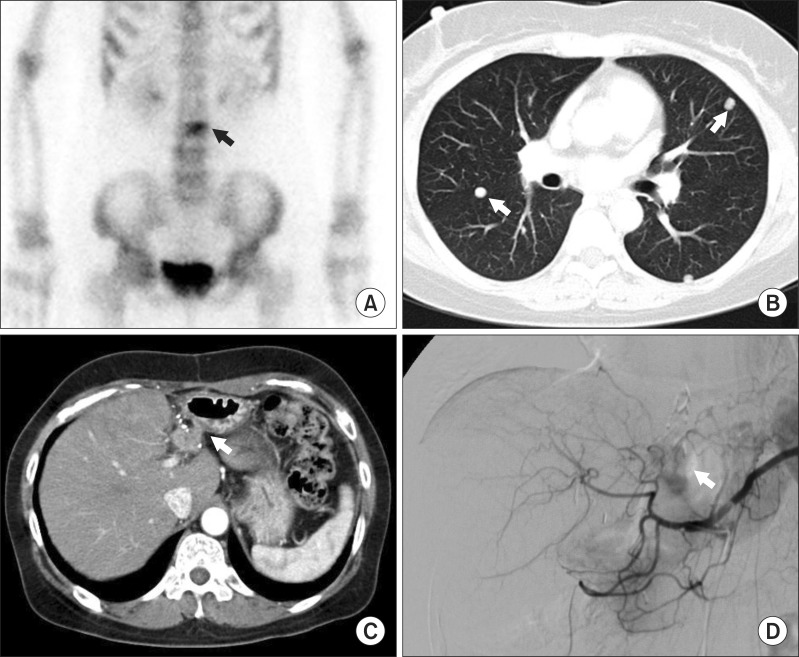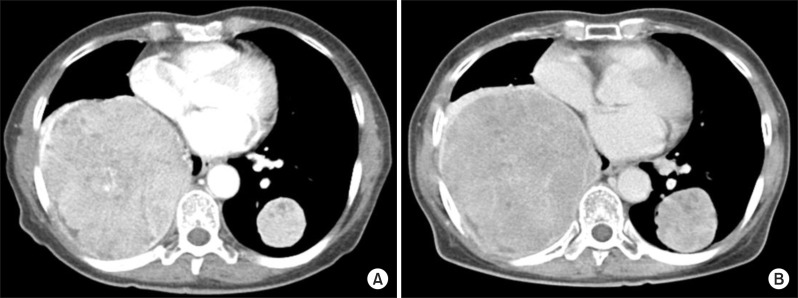Korean J Hepatobiliary Pancreat Surg.
2015 Feb;19(1):1-5. 10.14701/kjhbps.2015.19.1.1.
An interim safety analysis of hepatocellular carcinoma patients administrating oral vitamin K with or without sorafenib
- Affiliations
-
- 1Department of Surgery, Asan Medical Center, University of Ulsan College of Medicine, Seoul, Korea. shwang@amc.seoul.kr
- 2Department of Oncology, Asan Medical Center, University of Ulsan College of Medicine, Seoul, Korea.
- 3Asan Institute for Life Sciences, Asan Medical Center, Seoul, Korea.
- 4Department of Anatomy and Cell Biology, University of Ulsan College of Medicine, Seoul, Korea.
- KMID: 1802232
- DOI: http://doi.org/10.14701/kjhbps.2015.19.1.1
Abstract
- BACKGROUNDS/AIMS
Vitamin K may plays a role in controlling hepatocellular carcinoma (HCC) cell growth. In this study, we intended to present 5-year experience of 72 patients receiving oral vitamin K with or without sorafenib. Its end-point was to evaluate the safety of combination therapy using sorafenib and vitamin K.
METHODS
An interim analysis was performed as a single-arm cross-sectional study, including 72 HCC patients who underwent liver resection or transplantation and administered oral vitamin K2 alone (n=47) or with sorafenib (n=25).
RESULTS
In all patients, administration of vitamin K2 analog 45 mg/day did not show any noticeable adverse side-effect during vitamin K therapy of 23.3+/-10.6 months, except for one patient who experienced skin rash at the third day of vitamin K therapy. In 25 patients receiving sorafenib and vitamin K for 6 months or longer, any noticeable adverse side-effect suspected of vitamin K origin was not identified yet. A small proportion of patients showed unexpectedly favorable anti-tumor effects after use of vitamin K with or without sorafenib.
CONCLUSIONS
Because add-on of oral vitamin K did not increase the adverse side-effects of sorafenib, a combination therapy with these two agents appears to be worthy of further clinical trial with an expectation of synergistic therapeutic effects.
Keyword
MeSH Terms
Figure
Cited by 1 articles
-
Absence of antitumor effects of metformin in sorafenib-treated patients with hepatocellular carcinoma recurrence after hepatic resection and liver transplantation
Yong-Kyu Chung, Shin Hwang, Gi-Won Song, Young-Joo Lee, Ki-Hun Kim, Chul-Soo Ahn, Deok-Bog Moon, Tae-Yong Ha, Dong-Hwan Jung, Gil-Chun Park, Baek-Yeol Ryoo, Sung-Gyu Lee
Ann Hepatobiliary Pancreat Surg. 2018;22(4):297-304. doi: 10.14701/ahbps.2018.22.4.297.
Reference
-
1. Thiery JP, Sleeman JP. Complex networks orchestrate epithelial-mesenchymal transitions. Nat Rev Mol Cell Biol. 2006; 7:131–142. PMID: 16493418.
Article2. Grünert S, Jechlinger M, Beug H. Diverse cellular and molecular mechanisms contribute to epithelial plasticity and metastasis. Nat Rev Mol Cell Biol. 2003; 4:657–665. PMID: 12923528.
Article3. Habu D, Shiomi S, Tamori A, Takeda T, Tanaka T, Kubo S, et al. Role of vitamin K2 in the development of hepatocellular carcinoma in women with viral cirrhosis of the liver. JAMA. 2004; 292:358–361. PMID: 15265851.4. Ozaki I, Zhang H, Mizuta T, Ide Y, Eguchi Y, Yasutake T, et al. Menatetrenone, a vitamin K2 analogue, inhibits hepatocellular carcinoma cell growth by suppressing cyclin D1 expression through inhibition of nuclear factor kappaB activation. Clin Cancer Res. 2007; 13:2236–2245. PMID: 17404108.5. Kaneda M, Zhang D, Bhattacharjee R, Nakahama K, Arii S, Morita I. Vitamin K2 suppresses malignancy of HuH7 hepatoma cells via inhibition of connexin 43. Cancer Lett. 2008; 263:53–60. PMID: 18249064.
Article6. Murata K, Suzuki H, Okano H, Oyamada T, Yasuda Y, Sakamoto A. Cytoskeletal changes during epithelial-to-fibroblastoid conversion as a crucial mechanism of des-gamma-carboxy prothrombin production in hepatocellular carcinoma. Int J Oncol. 2009; 35:1005–1014. PMID: 19787254.
Article7. Dal Lago L, D'Hondt V, Awada A. Selected combination therapy with sorafenib: a review of clinical data and perspectives in advanced solid tumors. Oncologist. 2008; 13:845–858. PMID: 18695262.
Article8. Kuzuya T, Asahina Y, Tsuchiya K, Tanaka K, Suzuki Y, Hoshioka T, et al. Early decrease in α-fetoprotein, but not des-γ-carboxy prothrombin, predicts sorafenib efficacy in patients with advanced hepatocellular carcinoma. Oncology. 2011; 81:251–258. PMID: 22116493.
Article9. Ueshima K, Kudo M, Takita M, Nagai T, Tatsumi C, Ueda T, et al. Des-γ-carboxyprothrombin may be a promising biomarker to determine the therapeutic efficacy of sorafenib for hepatocellular carcinoma. Dig Dis. 2011; 29:321–325. PMID: 21829024.
Article10. Murata K, Suzuki H, Okano H, Oyamada T, Yasuda Y, Sakamoto A. Hypoxia-induced des-gamma-carboxy prothrombin production in hepatocellular carcinoma. Int J Oncol. 2010; 36:161–170. PMID: 19956845.
Article11. Yoshida H, Shiratori Y, Kudo M, Shiina S, Mizuta T, Kojiro M, et al. Effect of vitamin K2 on the recurrence of hepatocellular carcinoma. Hepatology. 2011; 54:532–540. PMID: 21574174.
Article12. Zhong JH, Mo XS, Xiang BD, Yuan WP, Jiang JF, Xie GS, et al. Postoperative use of the chemopreventive vitamin K2 analog in patients with hepatocellular carcinoma. PLoS One. 2013; 8:e58082. PMID: 23505456.
Article13. Llovet JM, Ricci S, Mazzaferro V, Hilgard P, Gane E, Blanc JF, et al. SHARP Investigators Study Group. Sorafenib in advanced hepatocellular carcinoma. N Engl J Med. 2008; 359:378–390. PMID: 18650514.
Article14. Cheng AL, Kang YK, Chen Z, Tsao CJ, Qin S, Kim JS, et al. Efficacy and safety of sorafenib in patients in the Asia-Pacific region with advanced hepatocellular carcinoma: a phase III randomised, double-blind, placebo-controlled trial. Lancet Oncol. 2009; 10:25–34. PMID: 19095497.
Article15. Ha TY, Hwang S, Hong HN, Choi YI, Yoon SY, WO YJ, et al. Synergistic effect of sorafenib and vitamin K on suppression of hepatocellular carcinoma cell migration and metastasis. Anticancer Res. [in press].16. Ha TY, Hwang S, Moon KM, Won YJ, Song GW, Kim N, et al. Sorafenib inhibits migration and invasion of hepatocellular carcinoma cells through suppression of matrix metalloproteinase expression. Anticancer Res. [in press].17. Friedl P, Wolf K. Tumour-cell invasion and migration: diversity and escape mechanisms. Nat Rev Cancer. 2003; 3:362–374. PMID: 12724734.
Article18. Gotzmann J, Mikula M, Eger A, Schulte-Hermann R, Foisner R, Beug H, et al. Molecular aspects of epithelial cell plasticity: implications for local tumor invasion and metastasis. Mutat Res. 2004; 566:9–20. PMID: 14706509.
Article19. Dooley S, Hamzavi J, Ciuclan L, Godoy P, Ilkavets I, Ehnert S, et al. Hepatocyte-specific Smad7 expression attenuates TGF-beta-mediated fibrogenesis and protects against liver damage. Gastroenterology. 2008; 135:642–659. PMID: 18602923.20. Imhof BA, Vollmers HP, Goodman SL, Birchmeier W. Cell-cell interaction and polarity of epithelial cells: specific perturbation using a monoclonal antibody. Cell. 1983; 35:667–675. PMID: 6652682.
Article
- Full Text Links
- Actions
-
Cited
- CITED
-
- Close
- Share
- Similar articles
-
- Treatments Other than Sorafenib for Patients with Advanced Hepatocellular Carcinoma
- Treatment options after sorafenib failure in patients with hepatocellular carcinoma
- The Efficacy of Sorafenib for Patients With Advanced Hepatocellular Carcinoma
- Optimal sequence of systemic therapy after sorafenib failure in patients with hepatocellular carcinoma
- Complete Response of Single Nodular Large Hepatocellular Carcinoma with Pulmonary Metastasis by Sequential Transarterial Chemoembolization and Sorafenib: A Case Report



